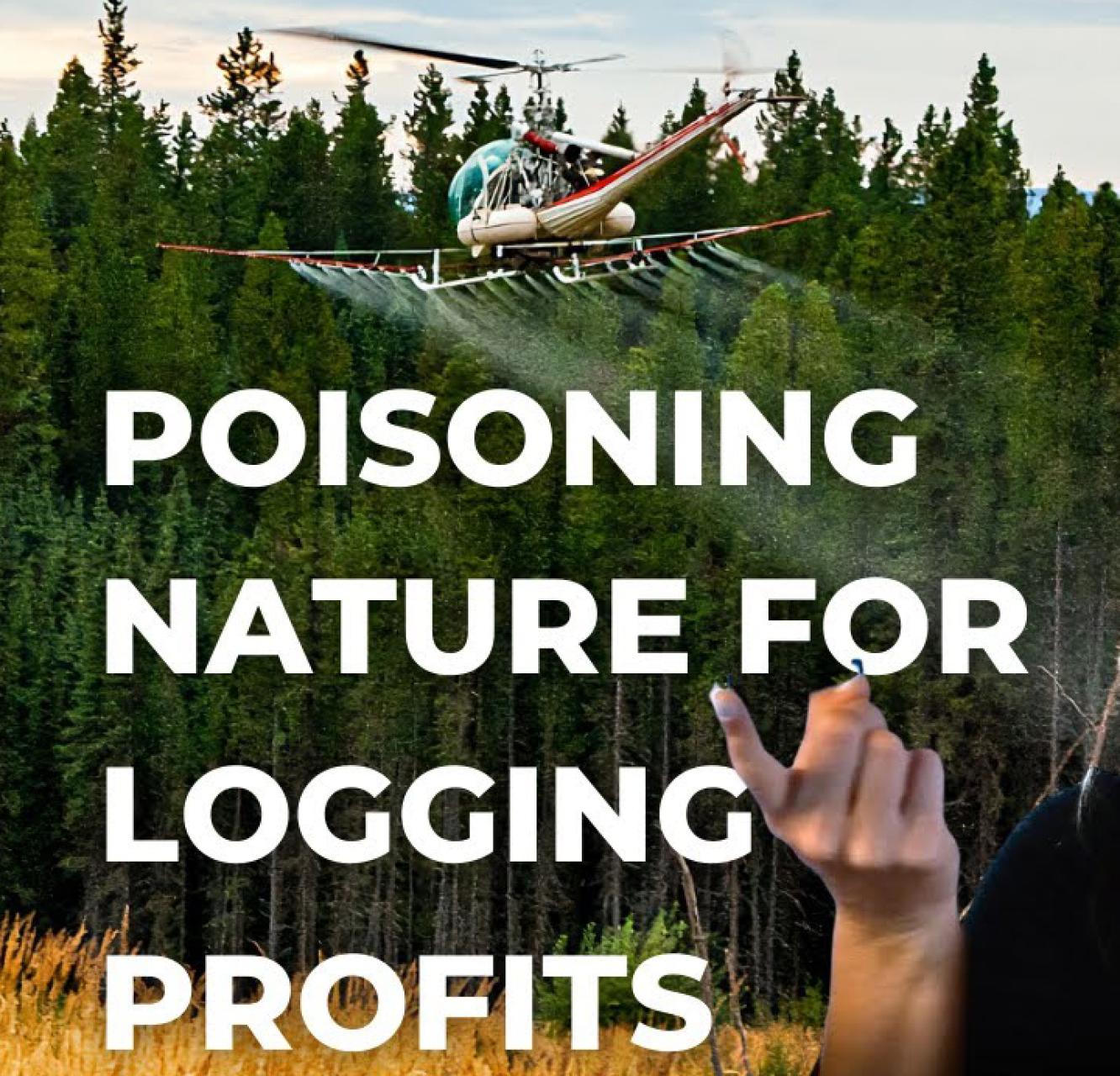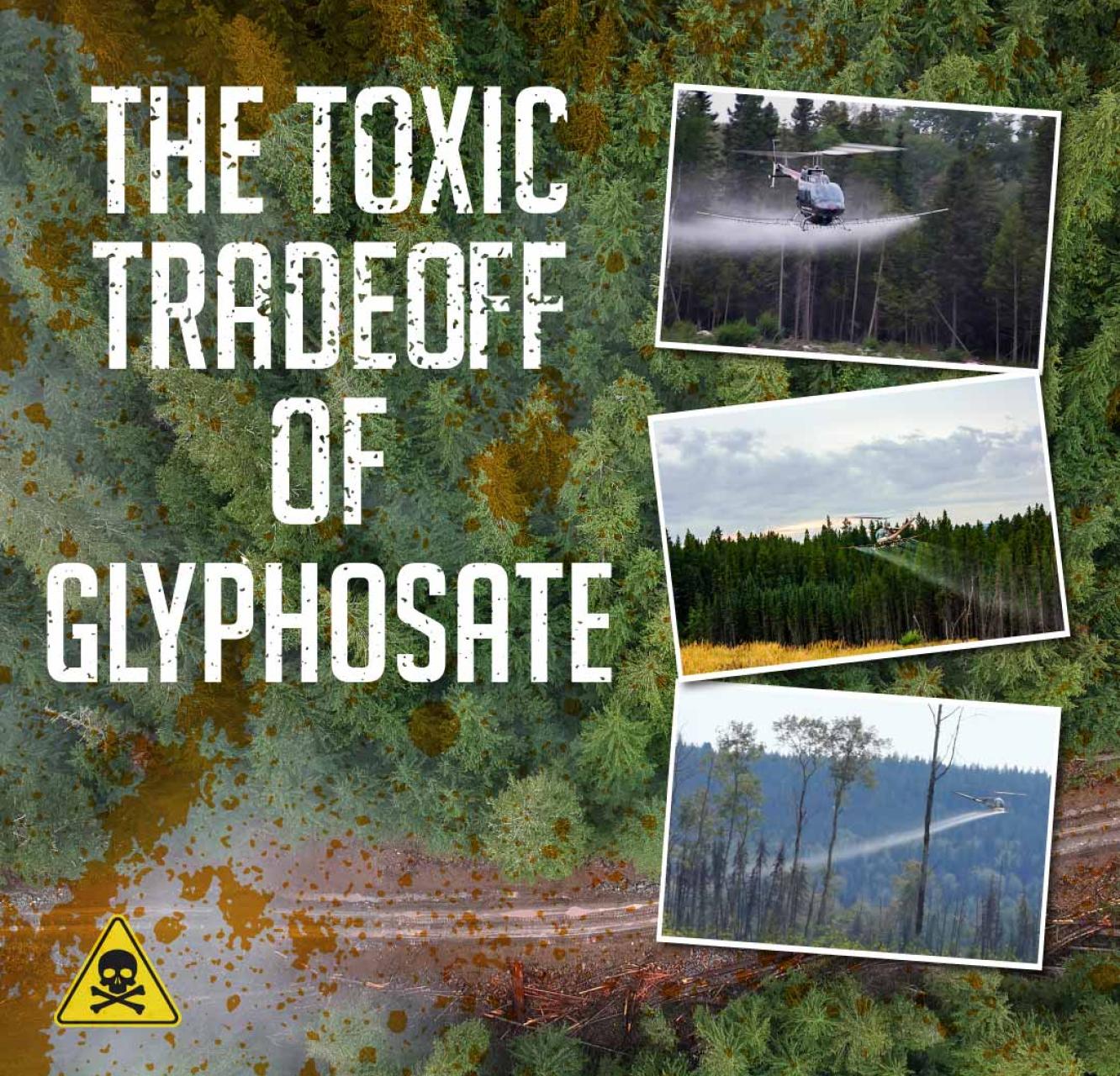Glyphosate
Stop toxic spray
Picture this: it’s a hot day, and as you walk through a clearcut forest with little shade, it gets even more intense. You notice that tree planters have been in the area, planting new cedar trees across the landscape. Yet among them, the huckleberries, alder saplings, raspberries and wildflowers are all yellowed and withered. The lack of food has hushed the buzz of bees that once filled the forest with life and butterflies that once flitted through the open space are nowhere to be seen.
The main culprit is glyphosate, the key chemical in herbicides such as RoundUp. Logging companies widely use it to promote the growth of commercial cash-crop species while killing the non-profitable ones, creating a tree plantation rather than a diverse forest. Unfortunately, this often means destroying native plants that are important for wildlife, traditional food, medicine and overall ecosystem health.
Take Action
Let forests grow declaration

Forests aren’t crops
Herbicides like glyphosate are widely used in agriculture and forestry. Treating forests like crops means sacrificing the many benefits a healthy, thriving ecosystem provides. Traditional medicinal plants are lost, flowers that support pollinators are declining, and forests are becoming hotter and drier. Many of the plants killed by glyphosate have natural fire resistance, making these areas even more prone to devastating wildfires.
In some jurisdictions, like B.C. and Alberta, glyphosate spraying is often mandated by law. In B.C., the ironically named “free-to-grow policy” requires companies to quickly establish a new crop of profitable trees after logging, often using glyphosate to do so. The impact on biodiversity at these sites is catastrophic. New Brunswick has the highest glyphosate use in forestry per land area among the provinces, and the First Nation leaders there say the practice severely affects their communities’ ability to harvest the land.
It’s clear that glyphosate is a controversial toxin that is harmful to ecosystems, and the herbicides containing it are damaging to human health. What remains uncertain is whether or not the harm is worth the benefits, even to corporations. Many conifer species grow better in the presence of a diverse plant community, yet the logging industry just can’t seem to move away from glyphosate by itself.
The fight ahead
In 2023, plans to spray glyphosate across nearly 10,000 hectares of replanted forests in Ma’amtagila and neighbouring Kwakwaka’wakw territory were nearly entirely halted, thanks to the combined efforts of the Wilderness Committee, the Awi’nakola Foundation, Indigenous leaders and public allies. Our advocacy forced TimberWest to reduce the spray area to less than 260 hectares, only about three per cent of the original plan.
This victory protected vital biodiversity, cultural harvesting areas and human health from the harms of herbicides. It also demonstrated the power of united, persistent resistance, especially when Indigenous sovereignty and ecological integrity are on the line. Join us as we continue to work with partners and Indigenous Nations to end the spray, once and for all.
Glyphosate impacts: controversial logging weapon killing forests and wildlife
For decades, logging corporations have been spraying toxic chemicals over cutblocks using a herbicide called glyphosate — a chemical that has serious health risks for humans and catastrophic impacts on entire kingdoms of life. This video takes you through the history, science and implications of glyphosate spraying in forests.
The toxic tradeoff of glyphosate
For decades, logging corporations have been spraying toxic chemicals over cutblocks using a herbicide called glyphosate. It’s the same chemical caught up in court case after court case in the U.S. for causing cancer in workers who spray it. The chemical not only has serious health risks for humans, but has catastrophic impacts on entire kingdoms of life — fungi, bacteria and plants are all killed by this chemical. Read on to learn more about this harmful practice and how you can help stop it.
Map of chemical herbicide (including glyphosate) sprayed cutblocks in B.C.
Controversial Logging Weapon Killing Forests And Wildlife
For decades, logging corporations have been spraying toxic chemicals over cutblocks using a herbicide called glyphosate — a chemical that has serious health risks for humans and catastrophic impacts on entire kingdoms of life. This video takes you through the history, science and implications of glyphosate spraying in forests.
The Toxic Tradeoff Of Glyphosate
For decades, logging corporations have been spraying toxic chemicals over cutblocks using a herbicide called glyphosate. It’s the same chemical caught up in court case after court case in the U.S. for causing cancer in workers who spray it. The chemical not only has serious health risks for humans, but has catastrophic impacts on entire kingdoms of life — fungi, bacteria and plants are all killed by this chemical. Read on to learn more about this harmful practice and how you can help stop it.
Check Out More Updates
Campaign Gallery

Join Us
Don’t miss your chance to make a difference. Receive campaign updates and important actions you can take to protect wildlife, preserve wilderness and fight climate change.







